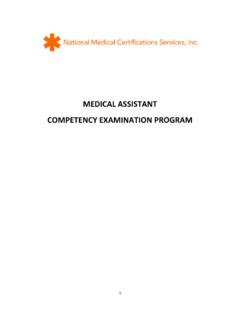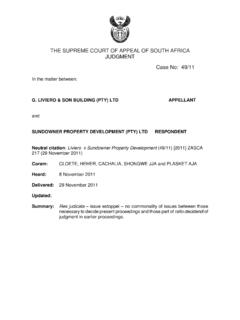Transcription of IN THE HIGH COURT OF SOUTH AFRICA (NORTH …
1 IN THE high COURT OF SOUTH AFRICA (NORTH GAUTENG high COURT ) Case number: 27212/2002 In the matter between: SHACKLETON CREDIT MANAGEMENT (PTY) LTD APPLICANT and J. M. GROBER 1ST RESPONDENT NEDBANK 2ND RESPONDENT JUDGMENT Delivered: 18 May 2009 POTTERILL AJ 1 In terms of the amended notice the Applicant is seeking an order that the applicant be substituted for Nedcor Bank Limited as a Plaintiff under case nr 2712/2002. The applicant further requests leave to consequentially amend the summons and Particulars of claim. 2 The sequence of events in this matter is very relevant, common cause and can be summarized as follows: Page 2 of The Plaintiff, Nedcor Bank Ltd issued summons against the defendant (first respondent to this application) on 2 October 2002 and the summons was served on the defendant on 16 October 2002.
2 The defendant filed a notice of intention to defend on 18 October 2002, but despite a Notice of Bar being served on her on 17 September 2002 no plea was filed. On 25 March 2003 the plaintiff, Nedcor Bank Limited ceded their claim to Lynn & Main Attorneys Inc. Lynn and Main Inc unconditionally ceded and made over to Nedrec(Pty)Ltd with effect from 1 July 2006. On 27 March 2007 Nedrec (Pty) Ltd changed its name to Lynn and Main Holdings (Pty)Ltd. On 21 September 2007 Lynn and Main Holdings (Pty) Ltd changed its name to Shackleton Credit Management (Pty) Ltd, the current applicant before the COURT . On 27 May 2005 the Registrar grants default judgment against defendant.
3 On 27 May 2008 Nedcor Bank Limited abandons the judgment against the defendant (first respondent) in terms of Rule 41(2). 3 The applicant argues that it has locus standi to launch the application as it has locus standi as cessionary. Furthermore the cession took place prior to litis contestatatio and the cession served to divest the plaintiff (second respondent) of all its rights. Accordingly the judgment was taken at a time when the second respondent had already divested itself of its rights against the First Respondent. The judgment was thus erroneously sought. It is argued that the effect of the abandoning is to revert the litigation to the point immediately prior to the taking of the Page 3 of 7default judgment and does not have the effect of abandoning the entire cause of action against the first respondent.
4 4 In the alternative application is made from the bar that the default judgment be rescinded in terms of Rule 42(1)(a). 5 On behalf of the first respondent it is argued that the abandoning of the judgment had the effect of res judicata barring the applicant from proceeding against the first respondent. In the alternative abandonment equates to a judgment of absolution form the instance. The abandonment is thus a final order and no party can proceed against the first respondent. 6 The respondent also argued that a distinction should be drawn between whether cession took place before or after litis contestation when it comes to cession of a res litigiosae.
5 7 Litis contestatio is the stage in litigation when the pleadings are closed as a result of: either party having joined issue without adding any new matter or another pleading; If the last day for filing a further pleading has passed and nothing further has been pleaded; If the parties file with the registrar an agreement that pleadings are closed; If the parties can t agree that pleadings are closed and the COURT on application declares them closed. In casu litis contestatio was the day after the expiry of the period in the notice of bar. Cession thus took place after litis contestatio. In Page 4 of 7 Brummer v Gorfil Brothers Investments (Pty) Ltd en Andere 1999(3) SA 389 (SCA) on 399 G-H the COURT found: In beginsel is daar geen rede om die sessie van n reg voor litis contestatio toe te laat, maar nie die sessie van die reg, titel en belang van die reghebbende in die aksie, onderhewig aan die regte van die verweerder, na litis contestatio nie.
6 Cession could thus take place after litis contestatio subject to the rights of the first respondent. The applicant is the cedent and had all right, title and interest in and to the claim. The applicant accordingly does have locus standi to bring the application. 8 In Waikiki Shipping Co. Ltd. V Thomas Barlow and Sons (Natal) Ltd and Another 1978(1) AD 671 the COURT found on p672 H: There is and can be no distinction in principle between the position after judgment and the position after litis contestatio. It is not so much a question of extending the practice of giving a cessionary after judgment such an election to cases cessions before judgment, but whether or not there is any difference in principle between what occurs after judgment and before judgment but after litis contestation.
7 There is authority for the practice of permitting a cessionary after litis contestation an election to decide either to continue the action in the name of the cedent or to have himself substituted of record for the cedent. 9 The respondent is submitting that the abandonment of the claim by the cedent bars the cessionary from being substituted. The reason for this is the claim being abandoned results in res judicata of the claim, alternatively absolution from the instance. In these circumstances the cedent was the correct party to abandon the judgment because Nedcor had the judgment in its name. At the time that default judgment was granted the cedent however had no title, right or interest to the claim and the default judgment was void.
8 Page 5 of 710 The correct procedure for the applicant to follow would have been an application for rescission of the judgment. In Jacobson v Havinga t/a Havingas 2001(2) SA 177 (T) it was found that default judgment, until rescinded, was binding and thus competent to sustain a plea of res judicata. In that matter a notice of withdrawal of the action was filed by the plaintiff after default judgment had been granted and a new summons was issued from a different COURT . The COURT found that in the new summons the plea of res judicata was competent because the COURT granting the default judgment although not having territorial jurisdiction did have jurisdiction in the sense to adjudicate upon, determine and dispose of the matter.
9 The judgment thus stood and constituted res judicata until set aside. 11 In casu the default judgment is however void and not effective as res judicata inter partes. In the alternative there is a request that the judgment be rescinded. As it is common cause that Nedcor had already ceded its rights they could not proceed with obtaining default judgment or abandoning the default judgment. The application for the rescission of the default judgment is clearly brought as an alternative to the void abandonment. The papers before me do not strictly comply with the requirements of rule 42. A COURT however has a discretion to correct an obviously wrong judgment and the respondent s representative did not in address object to a rescission of the judgment.
10 12 The further question is whether the abandonment of this default judgment does give rise to a defence of res judicata. In certain circumstances the abandonment of a judgment could arguably give rise to such a defence. In casu however the void abandonment of a void judgment can not be seen as a matter that has been finally disposed of. There was accordingly no finality to the issue in the matter. As stated in the Jacobson-matter (supra), the correct procedure would be to rescind the judgment and not abandoning of the judgment. I cannot find that the abandonment of a void default judgment constitutes absolution from the instance.

















